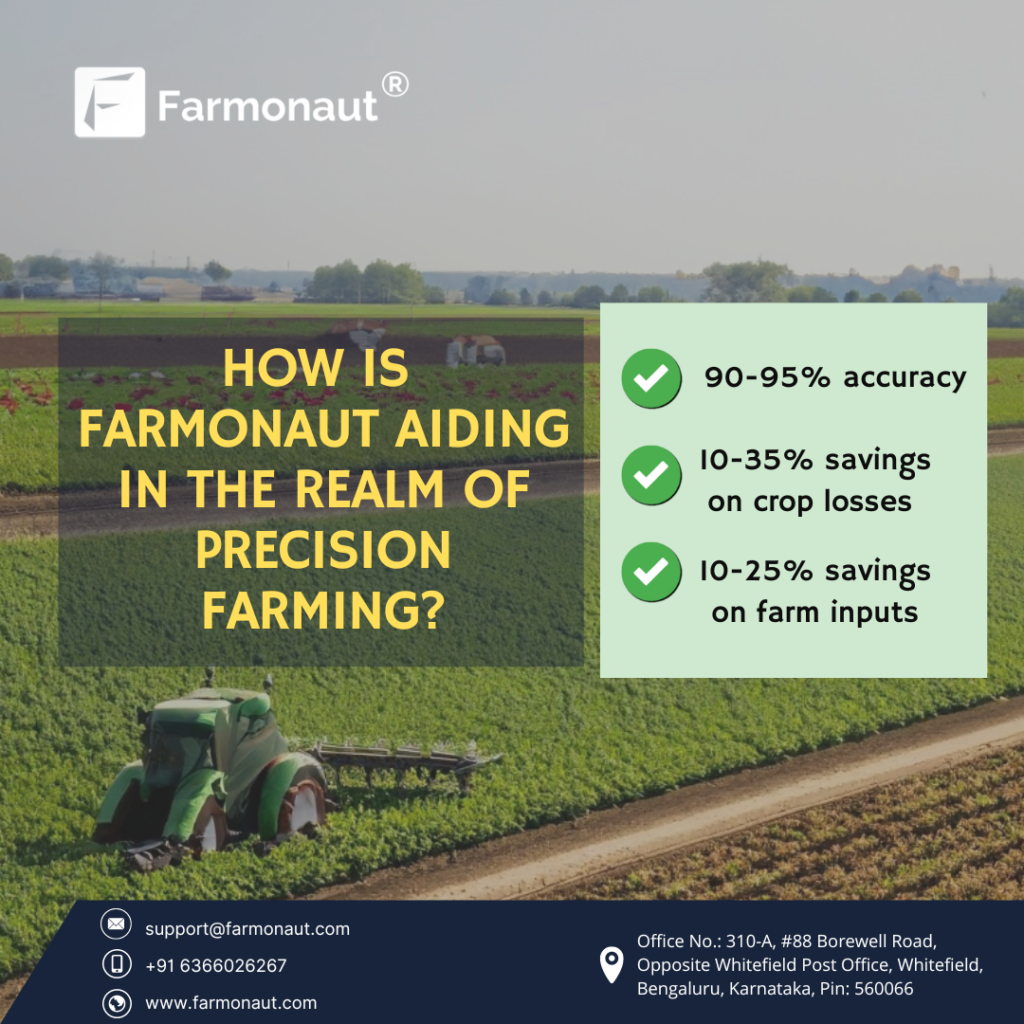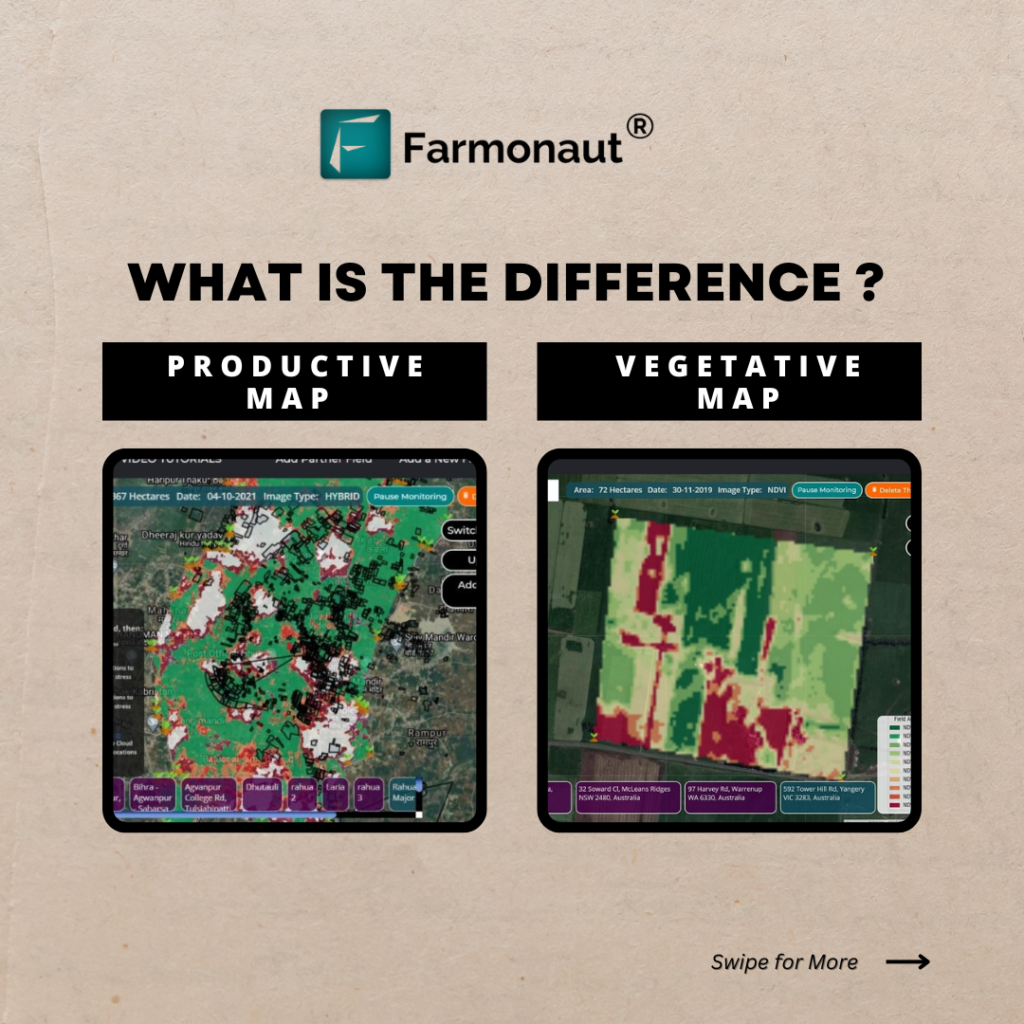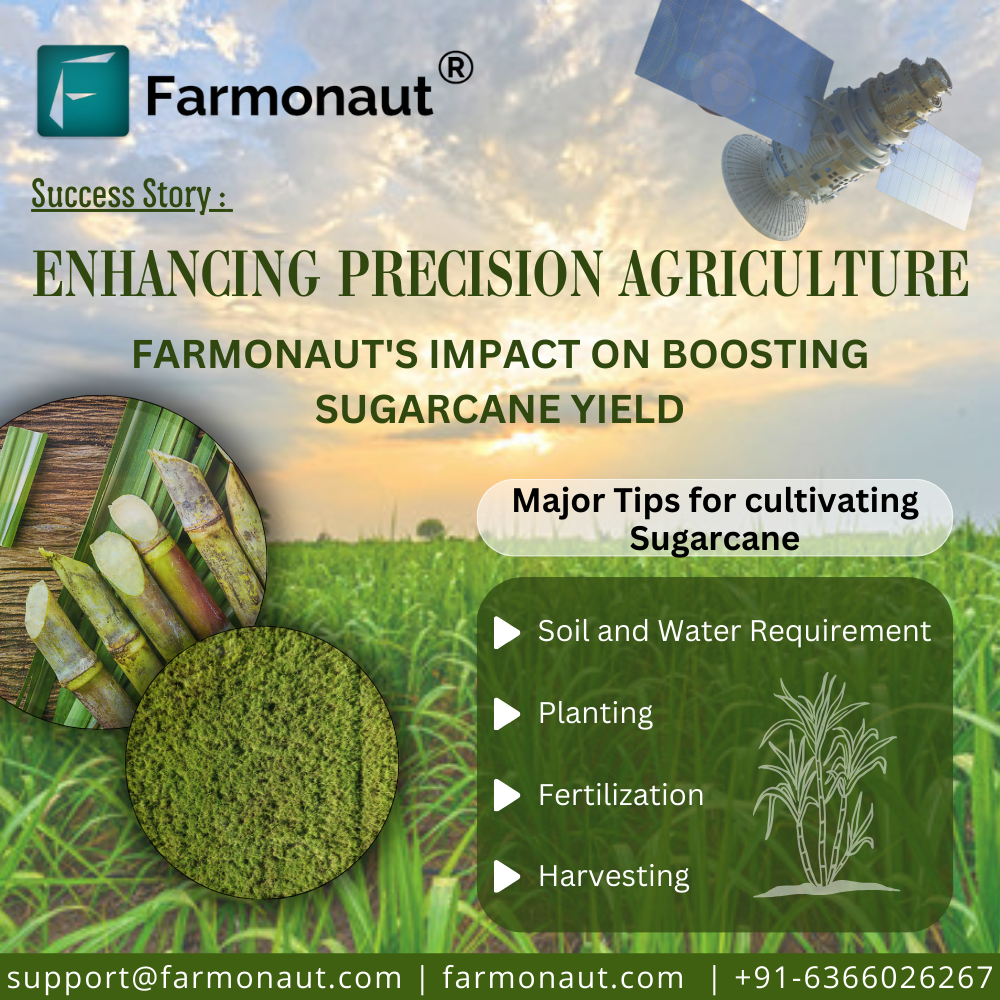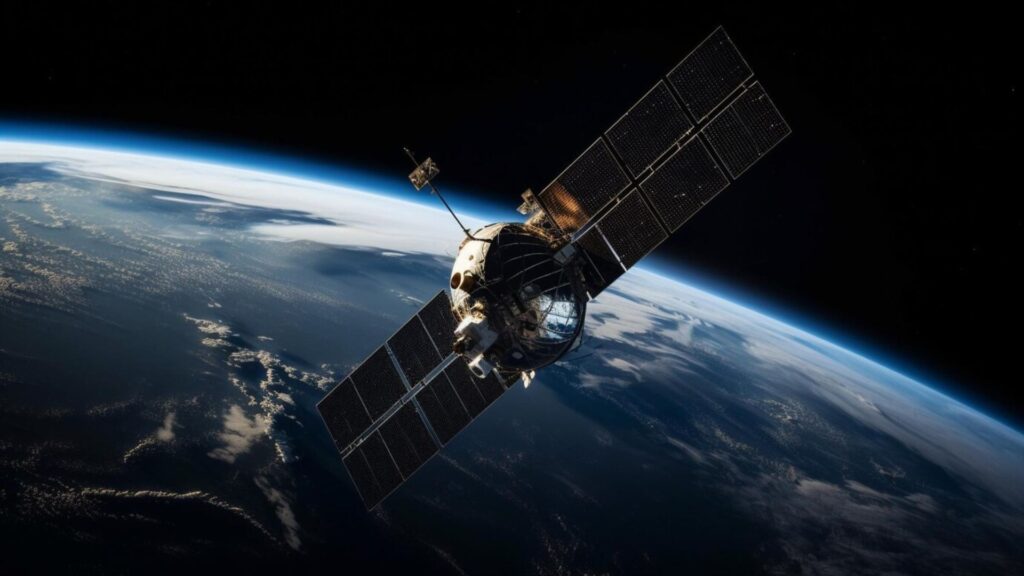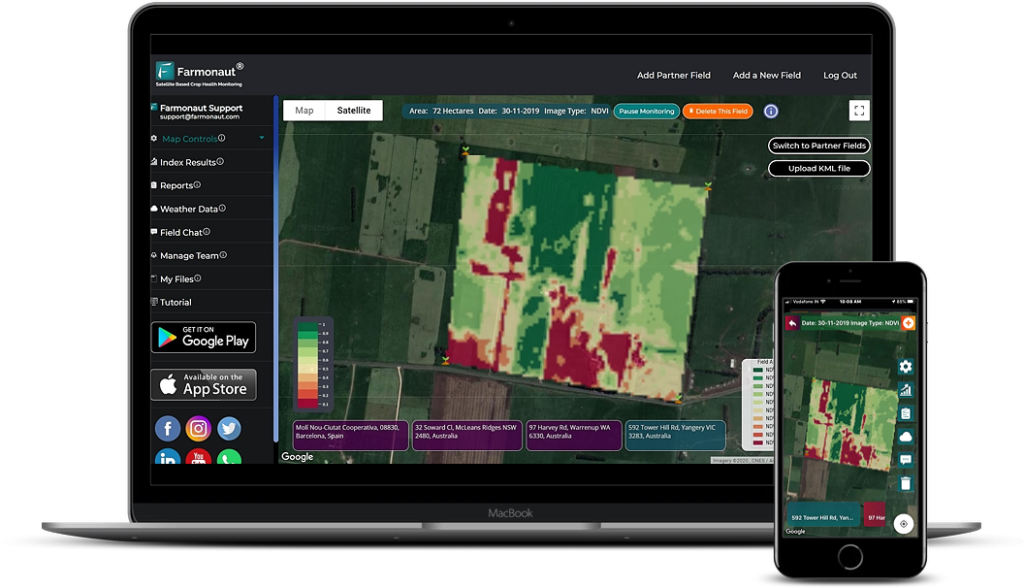Revolutionizing Agriculture: How Precision Livestock Farming Boosts Productivity and Sustainability
“Precision livestock farming can increase farm productivity by up to 30% through real-time monitoring and data-driven decision making.”
In the ever-evolving landscape of agriculture, we find ourselves at the cusp of a revolutionary transformation. Precision livestock farming (PLF) and sustainable agriculture technologies are reshaping the way we manage farm animals and optimize productivity. As we delve into this fascinating world of agricultural innovation, we’ll explore how cutting-edge data analytics and automated farm management systems are revolutionizing livestock operations.
At Farmonaut, we’re proud to be at the forefront of this agricultural revolution, offering advanced solutions that leverage remote sensing, GPS tracking, and smart sensors to monitor animal health, feed intake, and environmental conditions in real-time. Our mission is to make precision agriculture accessible and affordable for farmers worldwide, integrating innovative technology with traditional farming practices.
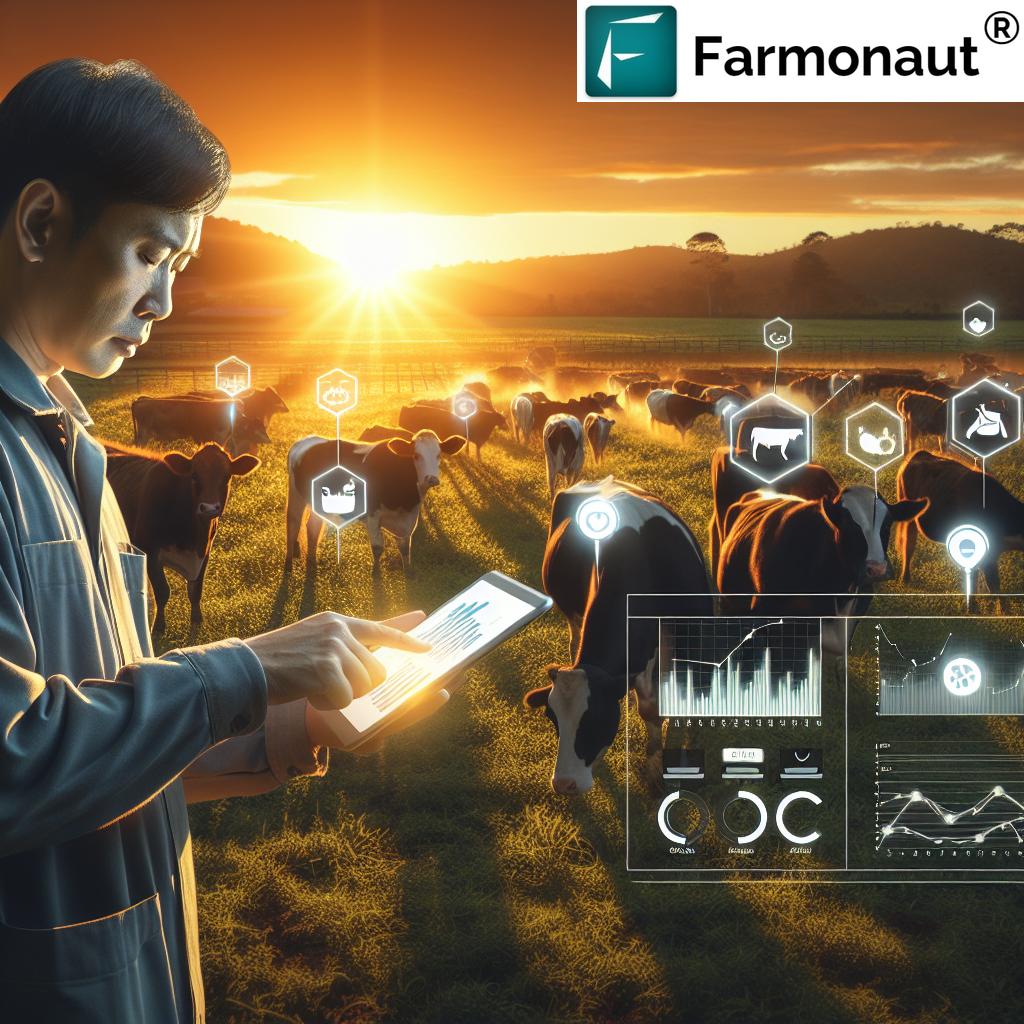
Understanding Precision Livestock Farming (PLF)
Precision livestock farming is an innovative approach that uses advanced technologies to monitor and manage individual animals within a herd. By employing a combination of sensors, data analytics, and automated systems, PLF enables farmers to make informed decisions about animal health, nutrition, and overall farm management.
Key components of PLF include:
- Real-time health monitoring
- Automated feeding systems
- Environmental control
- Behavior analysis
- Precision breeding
These technologies work together to create a holistic approach to livestock management, improving animal welfare, productivity, and sustainability.
The Role of Data Analytics in PLF
At the heart of precision livestock farming lies the power of data analytics. By collecting and analyzing vast amounts of information from various sources, farmers can gain unprecedented insights into their operations. Here’s how data analytics is transforming livestock management:
- Health Monitoring: Advanced sensors can detect subtle changes in animal behavior or physiological parameters, alerting farmers to potential health issues before they become serious.
- Feed Optimization: By analyzing feed intake and animal growth rates, farmers can fine-tune their feeding strategies to maximize efficiency and reduce waste.
- Environmental Control: Data from environmental sensors help maintain optimal conditions for livestock, improving animal comfort and productivity.
- Breeding Management: Genetic data analysis aids in selecting the best breeding pairs, improving herd quality over time.
At Farmonaut, we understand the importance of data in modern agriculture. Our platform integrates seamlessly with various data sources, providing farmers with actionable insights through our intuitive web and mobile applications. Learn more about our solutions by visiting our web app.
Sustainable Agriculture Technologies in PLF
Precision livestock farming goes hand in hand with sustainable agriculture technologies. As the global population grows and resources become scarcer, it’s crucial to adopt farming practices that are both productive and environmentally responsible. Here’s how PLF contributes to sustainability:
- Resource Efficiency: By optimizing feed, water, and energy use, PLF reduces waste and minimizes the environmental footprint of livestock operations.
- Reduced Emissions: Precise management of animal nutrition and waste can significantly lower greenhouse gas emissions, particularly methane from cattle.
- Land Use Optimization: Improved productivity means more efficient use of land resources, potentially reducing deforestation and habitat loss.
- Water Conservation: Smart irrigation systems and water monitoring technologies help conserve this precious resource.
Farmonaut’s satellite-based crop health monitoring and AI-driven advisory systems play a crucial role in promoting sustainable agriculture. Our technologies help farmers make informed decisions about resource use, reducing environmental impact while maintaining high productivity.
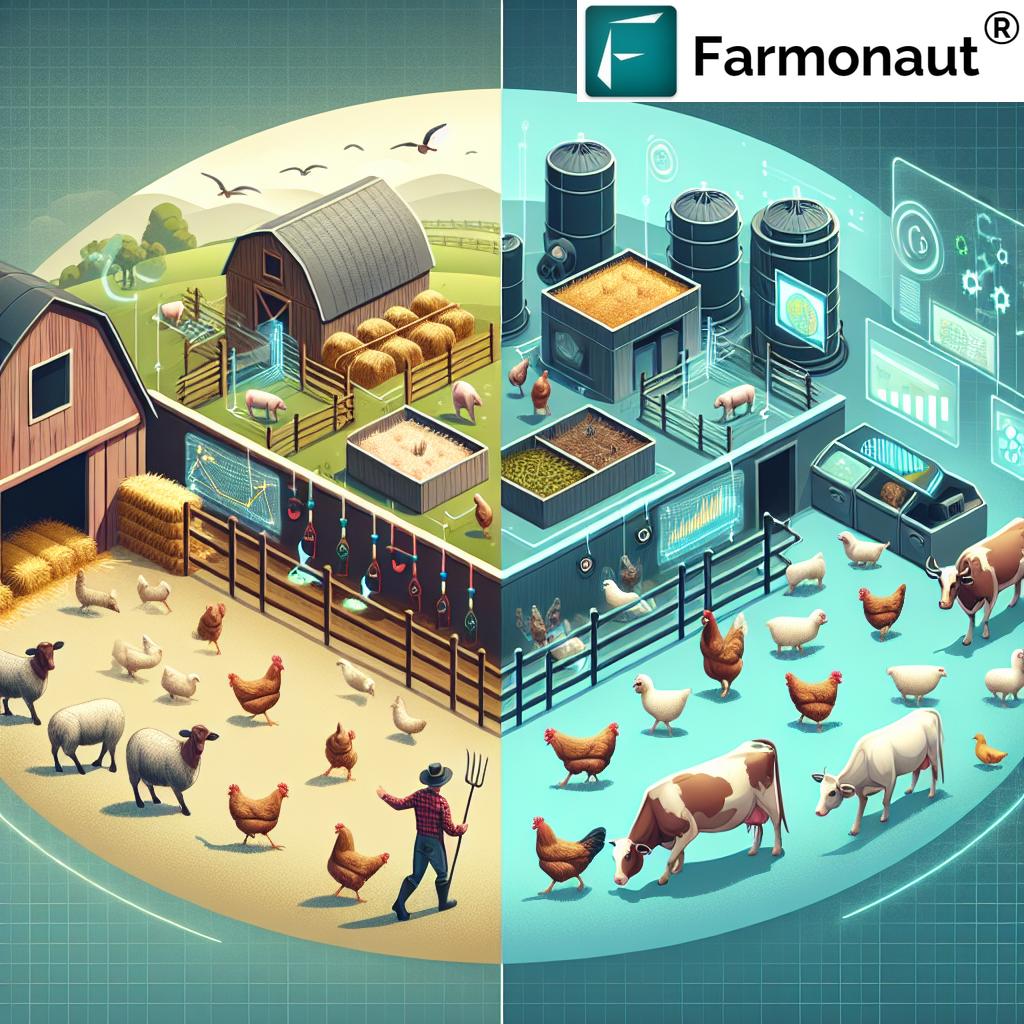
Farmonaut’s Cutting-Edge Solutions for PLF
At Farmonaut, we’re committed to providing innovative solutions that empower farmers to embrace precision livestock farming. Our platform offers a range of tools designed to enhance productivity and sustainability:
- Satellite-Based Crop Health Monitoring: Our advanced satellite imagery analysis provides crucial insights into vegetation health and soil moisture levels, helping farmers optimize feed production for their livestock.
- Jeevn AI Advisory System: This AI-driven tool delivers personalized recommendations for farm management, including livestock care and feed optimization.
- Blockchain-Based Product Traceability: Ensure transparency and security in your livestock supply chain with our cutting-edge blockchain solutions.
- Fleet and Resource Management: Optimize your farm operations with our comprehensive management tools, designed to improve efficiency and reduce costs.
- Carbon Footprinting: Monitor and reduce your environmental impact with real-time emissions tracking and sustainability analytics.
To explore how Farmonaut can revolutionize your livestock operations, check out our Android app or iOS app.
“Advanced PLF systems can reduce water usage in livestock operations by up to 40%, contributing significantly to sustainable agriculture practices.”
Benefits of Precision Livestock Farming
The adoption of precision livestock farming technologies offers numerous benefits for farmers, animals, and the environment. Let’s explore these advantages in detail:
| Metrics | Traditional Farming | Precision Livestock Farming |
|---|---|---|
| Feed Efficiency (%) | 60-70% | 80-90% |
| Animal Health Monitoring Frequency | Weekly/Monthly | Continuous (Real-time) |
| Resource Usage Optimization (%) | 50-60% | 80-90% |
| Environmental Impact Reduction (%) | Baseline | 20-30% Reduction |
| Labor Efficiency (hours saved/week) | Baseline | 10-20 hours |
| Productivity Increase (%) | Baseline | 20-30% Increase |
As we can see from the table above, precision livestock farming offers significant improvements across various aspects of farm management. Let’s delve deeper into these benefits:
1. Improved Animal Health and Welfare
One of the most significant advantages of PLF is the ability to monitor animal health in real-time. Advanced sensors can detect early signs of illness or distress, allowing for prompt intervention. This proactive approach not only improves animal welfare but also reduces the need for antibiotics and other medications, contributing to food safety and sustainability.
2. Enhanced Productivity and Efficiency
By optimizing feeding strategies, environmental conditions, and breeding programs, PLF can significantly boost farm productivity. Automated systems reduce labor requirements, allowing farmers to focus on strategic decision-making rather than routine tasks.
3. Resource Optimization
Precision farming techniques enable more efficient use of resources such as feed, water, and energy. This not only reduces operational costs but also minimizes the environmental footprint of livestock operations.
4. Data-Driven Decision Making
With access to real-time data and advanced analytics, farmers can make informed decisions about their operations. This data-driven approach leads to more precise management and better long-term planning.
5. Environmental Sustainability
By reducing resource waste and optimizing farm operations, PLF contributes to more sustainable agriculture practices. This includes reduced greenhouse gas emissions, improved water management, and better land use efficiency.
At Farmonaut, we’re dedicated to helping farmers realize these benefits through our advanced agricultural solutions. Our platform integrates seamlessly with various PLF technologies, providing a comprehensive approach to farm management. Explore our API to see how you can integrate our solutions into your existing systems.
Challenges and Solutions in Implementing PLF
While the benefits of precision livestock farming are clear, implementing these technologies can present some challenges. Let’s explore common issues and how innovative solutions, like those offered by Farmonaut, are addressing them:
1. Initial Investment Costs
Challenge: The upfront costs of implementing PLF technologies can be significant, especially for smaller farms.
Solution: Farmonaut offers scalable solutions that allow farmers to start small and expand their use of precision technologies as they see returns on their investment. Our subscription-based model makes advanced agricultural technologies more accessible to farms of all sizes.
2. Technical Expertise
Challenge: Many farmers may lack the technical skills to fully utilize advanced PLF systems.
Solution: We provide comprehensive training and support to help farmers get the most out of our platform. Our user-friendly interface and AI-driven advisory system make it easy for farmers to interpret and act on data insights.
3. Data Management and Integration
Challenge: Handling large volumes of data from various sources can be overwhelming.
Solution: Farmonaut’s platform is designed to seamlessly integrate data from multiple sources, providing a unified interface for farm management. Our advanced analytics tools help farmers make sense of complex data sets.
4. Connectivity Issues
Challenge: Many rural areas lack reliable internet connectivity, which can hinder the implementation of real-time monitoring systems.
Solution: Our platform is designed to work with intermittent connectivity, storing data locally when necessary and syncing when connections are available. We also leverage satellite technology to provide coverage in remote areas.
5. Regulatory Compliance
Challenge: Navigating the complex landscape of agricultural regulations can be daunting for farmers adopting new technologies.
Solution: Farmonaut stays up-to-date with regulatory requirements and ensures our solutions help farmers maintain compliance. Our traceability features are particularly useful for meeting food safety and sustainability standards.
By addressing these challenges head-on, we’re making precision livestock farming more accessible and effective for farmers around the world. For more information on how we can help you overcome these hurdles, check out our API Developer Docs.
The Future of Precision Livestock Farming
As we look to the future, it’s clear that precision livestock farming will play an increasingly important role in global agriculture. Here are some trends and innovations we anticipate shaping the industry:
- Artificial Intelligence and Machine Learning: These technologies will become more sophisticated, offering even more accurate predictions and recommendations for farm management.
- Internet of Things (IoT) Integration: Greater connectivity between farm devices and systems will lead to more comprehensive and seamless farm management.
- Robotics and Automation: Advances in robotics will automate more farm tasks, from feeding to cleaning, further improving efficiency.
- Genome Editing: Precision breeding techniques will help develop livestock breeds that are more resilient, productive, and environmentally friendly.
- Virtual and Augmented Reality: These technologies will offer new ways to visualize farm data and train farm workers.
At Farmonaut, we’re committed to staying at the forefront of these technological advancements. Our team of experts continually updates our platform to incorporate the latest innovations in agricultural technology, ensuring that our users always have access to cutting-edge solutions.
Conclusion: Embracing the PLF Revolution
Precision livestock farming represents a paradigm shift in agricultural practices, offering a path to more productive, sustainable, and responsible animal husbandry. By leveraging advanced technologies and data-driven insights, farmers can optimize their operations, improve animal welfare, and reduce environmental impact.
As we’ve explored throughout this article, the benefits of PLF are numerous and significant. From improved feed efficiency and animal health to reduced labor costs and environmental footprint, precision farming techniques are revolutionizing the livestock industry.
At Farmonaut, we’re proud to be part of this agricultural revolution. Our comprehensive platform offers farmers the tools they need to embrace precision livestock farming, regardless of their operation’s size or current technological capabilities. By making advanced agricultural technologies accessible and affordable, we’re helping to create a more sustainable and productive future for farming.
We invite you to join us on this journey towards smarter, more efficient livestock management. Explore our solutions, from our user-friendly mobile apps to our powerful API integrations, and discover how Farmonaut can help transform your farming operations.
Together, we can revolutionize agriculture, boost productivity, and build a more sustainable future for generations to come.
FAQs
- What is precision livestock farming (PLF)?
Precision livestock farming is an approach that uses advanced technologies like sensors, data analytics, and automation to monitor and manage individual animals within a herd, optimizing health, productivity, and sustainability. - How does PLF improve animal welfare?
PLF enables real-time health monitoring, early detection of illnesses, and optimization of environmental conditions, leading to better overall animal welfare and reduced need for medications. - Can small farms benefit from precision livestock farming?
Yes, PLF solutions like those offered by Farmonaut are scalable and can be tailored to farms of all sizes, making advanced agricultural technologies accessible to small farmers. - How does PLF contribute to sustainable agriculture?
PLF enhances resource efficiency, reduces waste, lowers greenhouse gas emissions, and optimizes land use, all contributing to more sustainable farming practices. - What role does data analytics play in precision livestock farming?
Data analytics is crucial in PLF, helping farmers make informed decisions by analyzing information from various sources to optimize animal health, nutrition, breeding, and overall farm management.
Ready to revolutionize your farming practices? Explore Farmonaut’s precision agriculture solutions today!





